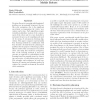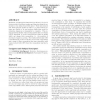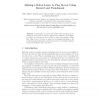1033 search results - page 64 / 207 » An autonomic failure-detection algorithm |
ICML
2000
IEEE
14 years 9 months ago
2000
IEEE
Decision-theoretic reasoning and planning algorithms are increasingly being used for mobile robot navigation, due to the signi cant uncertainty accompanying the robots' perce...
GECCO
2009
Springer
14 years 3 months ago
2009
Springer
Evolution of multi-agent teams has been shown to be an effective method of solving complex problems involving the exploration of an unknown problem space. These autonomous and het...
KI
2007
Springer
14 years 2 months ago
2007
Springer
In this paper, we show how reinforcement learning can be applied to real robots to achieve optimal robot behavior. As example, we enable an autonomous soccer robot to learn interce...
EUROCAST
2005
Springer
14 years 2 months ago
2005
Springer
After having designed control systems for real autonomous cars in an urban environment using straight lines as reference [2], we are now trying to build a fuzzy control system base...
GECCO
2004
Springer
14 years 2 months ago
2004
Springer
This paper proposes an evolutionary framework where a network service is created from a group of autonomous agents that interact and evolve. Agents in our framework are capable of ...



